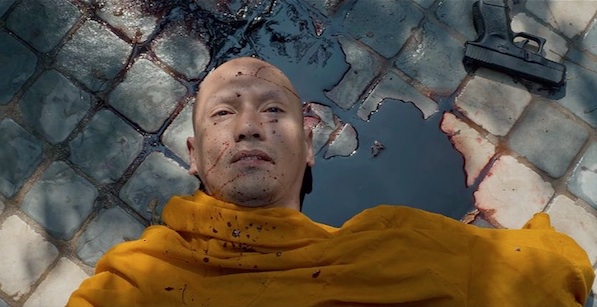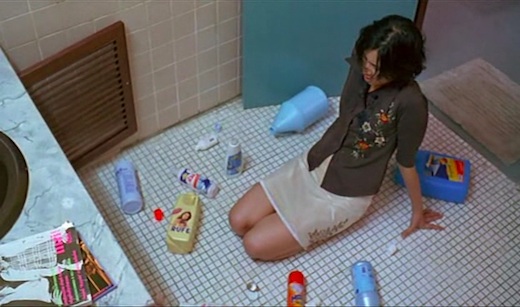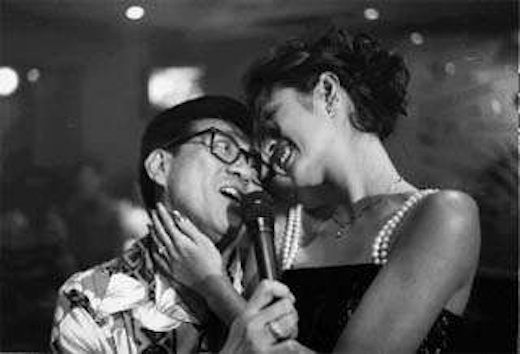It was a friend who recommended I go see Tsai Ming-liang’s Vive L’Amour (1996). She had one request, though: “Go see it alone.” I didn’t obey that request the first time I saw it at the Castro Theatre in San Francisco, but I understood what she meant. The film is about disconnected people floating through Taipei. Being alone while watching Vive L’Amour enhances the experience, enabling emphatic empathy with the lonely characters on screen. Many art films benefit from being watched while in a lonely state for this same reason. Another director for whom Roy Orbison croons is Thailand’s Pen-ek Rataranuang. He came to SF for a retrospective of his work at the Yerba Buena Center for the Arts in April. With his arrival came a post on Brian Darr’s blog Hell on Frisco Bay where Darr pulled a Rataranuang quote from the book Southeast Asian Independent Cinema (Ed. Tilman Baumgartel, Hong Kong University Press, 2012); “Lonely people tend to like my films a lot. Happy people don’t seem to get my films.” I knew this quote provided the perfect opener for my interview with Rataranuang in the YBCA offices.
Keyframe: Do you still feel that is a valid summary of your work?
Pen-ek Rataranuang: Yeah, Yeah, absolutely.
Keyframe: What brings you to say that?
Rataranuang: Well, I haven’t done research or anything. It’s from experience. The people who like my films, they might be Thai, they might not be Thai, the people that like my films, they’re not like ‘happy-happy’ people.
Keyframe: Would you describe the characters in your films as lonely people, or just characters that lonely people would like?
Rataranuang: The characters in my films are lonely, but I think I have to define the word ‘lonely’.
Keyframe: Please do.
Rataranuang: Because for normal people, when you say that you are a lonely person, they go, ‘Oh, poor you.’ And I go, ‘No, I like being this way. I don’t like to be with a lot of people.’ To me, ‘lonely people’ is a positive sense. I don’t mean ‘lonely people’ in a negative sense . . .
In fact, I think I’ve become who I am today, and I’ve accomplished a certain amount of things in my life today, because I have been a lonely person. Otherwise I would not accomplish anything. If you were with your friends all the time, you’d be, like, drinking all the time, you’d be having fun all the time. In that sense, that’s what I mean by ‘lonely people.’
Keyframe: Like people say that writing is a lonely profession, and it has to be a lonely profession …
Rataranuang: Of course …
Keyframe: … To get the work done. In a film like Headshot, it’s not like the main character is lonely, because he’s meeting people, he’s interacting with people.
Rataranuang: But he’s lonely in that everyone around him is different from him.
Keyframe: Yeah, he’s trying to connect with people on a deeper level of trying to make oneself understood.
Rataranuang: Right, right. It’s a well-known fact in Thailand that if you’re a policeman, you have to accept bribes. It’s a known fact. The character in the film, he doesn’t [take bribes]. He wants to be a good cop.
Keyframe: And in that way he’s alone.
Rataranuang: In that way he’s alone, exactly. He becomes a minority.
Keyframe: I’m actually kinda curious about the reality of something in that film. I realize it’s a story. I don’t want to impose reality on it. [But] I’ve seen this in other movies. How common is it that criminals will actually join monasteries and become monks? Or is it just a trope that we see in a lot of films. Because I can think of South Korean films where this happens too.
Rataranuang: For my country, it’s a well-known fact. It’s the easiest thing. A lot of criminals actually become monks because to become a monk in Thailand is so easy.
Keyframe: Really?
Rataranuang: Because you don’t have to take any test… It’s much easier than, say, going to university. It’s much easier than getting married. All you have to do is just go to the monk, go to the bishop of the temple, and say that you want to be a monk. You just shave your head, they gave you a robe, and you live that life.
In reality, how can you [be a monk]? Yesterday, you just robbed somebody. For the past five years, you’ve been robbing people. You’ve been sneaking into people’s homes, stealing televisions and computers. And one day you become a monk. Tomorrow or next week, there’s no guarantee you’re not going [to return to crime]. A lot of criminals that join monkhood still stay a criminal. It’s not a guaranteed thing that cleans you.
Keyframe: You had mentioned before we’d started recording how you’re a filmmaker, but you don’t like to see a lot of films. Could you talk about that a little bit? What brought you to be a filmmaker then?
Rataranuang: It’s cinema that actually inspired me to become a filmmaker, for sure. I watched a lot of films before. I went to university in New York, [Pratt Institute]. I had no interest in cinema. I was crazy about football, soccer. I wanted to be a serious, professional soccer player. But having lived in New York, I would go and watch movies like any other person would watch movies. I would watch Hollywood movies.
The first film that shocked me out of my skull was 8 1/2 by Fellini. And I didn’t know anything about art movies. I didn’t know anything about Fellini. I didn’t know anything at that time. I think I was in my first year at university. I went into town and I saw this beautiful poster, movie poster. It’s black and white, with a guy with a hat. You see these black-rimmed glasses. It just looks so good. And the lettering, 8 1/2, was strange. I thought, ‘Oh, this is a movie.’ I went in to see that movie. After it was finished, I couldn’t understand anything, but it really blew me away. I couldn’t get up from the seat. That experience was so overwhelming.
And I didn’t understand a thing, you know. ‘What the hell was this?’ right? But it was like falling in love. Like you don’t understand this girl at all. But somehow, you just want to keep looking at her. You want to hold her. It’s very strange, very strange. It’s so attractive, that movie to me was so attractive, so beautifully shot.
Keyframe: When you think about it, how beautiful it is to go into see Fellini’s 8 1/2, a film that’s been talked about for so long…. For you to go in to it completely fresh, I could imagine it’s such an incredible experience.
Rataranuang: Yeah, but what really bothered me is I really didn’t understand anything. [Laughter.] ‘Is there a story? Is this a movie?’
But I think it kind of opened me up to realize that there is another kind of movie. I didn’t know that before. First of all, it’s black and white. I thought you had to be old movie to be black and white. It’s not like 8 1/2 was made in the 1930s.
So the next day I went again. And the next day I went to see the same film again. Hoping that I might understand something. When the film ended, I didn’t understand anything more but I felt even more attracted to it. And afterwards I started to realize that there is this type of film. Then I saw that there was a guy called Ingmar Bergman. Then I noticed there was a guy called Akira Kurosawa, who was much closer to my country than America. I didn’t know any of these people, Francois Truffaut, Godard…
But it was shocking, all these films. And what I love about them is that there are so many nude people. There’s so much nudity! I loved it! And all these beautiful girls, I can’t believe it. She’s so beautiful and she just takes off her clothes. You see her pubic hair. I’m like, ‘God, this is great!’
I think that’s how I caught this cinema disease. Of course, when you watch those films, you would never think of becoming a filmmaker. Because you think that only geniuses make films. You wouldn’t think a normal person would make films.
But then I went back to Thailand, one thing falls back into another. I was supposed to work for a refugee camp at the time. Then I ended up in advertising. Again, because a friend asked me to go and have an interview in his office. I didn’t know anything about advertising but he said, ‘But I want you to come work with me.’
I did some design work in New York. He said, ‘You could design some packaging and stuff.’ So I went to work there. I went to an interview in that advertising office and there were so many beautiful girls. I said, ‘It’s not such a bad job.’ You get paid and those women are around you. And you get to work with photography and things. I thought, ‘Oh, it’s like play.’
After four years in an advertising agency, the same friend, he actually opened a production company. He asked me if I wanted to direct TV commercials. So I said, ‘OK, sure, I will try anything once.’ I think when I started working in TV commercials, directing TV commercials, that’s when I started to seriously flirt with the idea of making films. I thought, ‘I don’t know. Maybe I’ll go another step and make a real film.’
So one day I just sat down and wrote a script and looked for money and made my first film. That was called Fun Bar Karaoke (1997). It’s not a good film, you know. But, I made a film. [He laughs.] I made a film and I knew immediately it was not good. We did a good thing. If I’m like any other director who falls in love with his work, then I would not improve. I knew that individual scenes in that film were good but when we put them together, they were not good. There’s no rhythm, you know, [tapping the table]. So I immediately knew what’s wrong with it and I quickly made my next film. I solved all the problems. I thought it was quite good. It’s called 6ixtynin9 (1999). There was a lot of bad acting in it but the film has rhythm, and it has so much sense of humor that you forgive the bad acting.
So I learned film by making them. And I used to watch a lot of films during that time. I remember before I made my first film, I actually sat down and watched Bullets Over Broadway (Woody Allen, 1994) about twenty times. And I actually timed each scene, how long it is. I was like, ‘OK, here’s how it’s made.’ I was self-taught. But later on in my life, I would say the last five years, I watch less and less films. It’s just because there are so many films being made now that I can’t keep up. And then, to find one good film, you have to go through so much junk to find one








